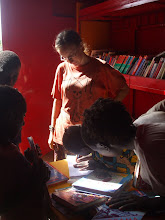 This is a very dated picture of me and a few other Volunteers, at the WAIST party. Don't we clean up good?
This is a very dated picture of me and a few other Volunteers, at the WAIST party. Don't we clean up good?It's Easter monday so, of course, we have yet another "jour ferie". Although less than five percent of the country is Catholic, everybody gets the days off. Also, last wednesday was the "Gamou" celebration of the prophet Mohammad's birthday. Almost everyone cleared out of my village to go to Kaolack for the event, which left only a few of us in an unusually quiet Keur Ali Gueye. They all came back wearing fancy clothes, new jewelry, and toys for the kids. Noos yu bare! Meanwhile I have finally got a little tree nursery started in my backyard. Hopefully I will eventually have a hundred baby trees to outplant in the rainy season. I also plan to have sacs and seeds available to the villagers, if they want pepinieres of their own. We'll see how that goes! Mango season is starting, too, which makes me very excited. I love mangoes. There will be a stash of them hidden in my hut. The trees are shady and beautiful, with the heavy fruits hanging off in all stages of development. It's so exciting! Yesterday of course was Easter. It was an awesome time! I went to a friend's town, where four of us congregated to celebrate. Celebrations are of a significantly different caliber here. Ours involved going wallowing in the shallow salty river nearby, cooling off in the heat of the afternoon. Dinner was another highlight of the day. We bought a ton of vegetables at the market: lettuce, carrots, eggplants, tomatoes, onions, and green peppers. These we sauteed lightly, then simmered in spaghetti sauce with a little salt and pepper. The spaghetti we bought had bugs living in it, but, we shook out most of them and boiled it anyway. Extra protein, right? Boiling sanitizes everything. For the side, we mixed a green salad in a bathing bucket. Ah, Peace Corps gourmet! The dinner was truly delicious. We wound our fingers into the piping hot spaghetti, tipping our heads back to dangle it into our mouths. With fresh village bread we wiped up the chunky vegetable sauce, and we took handfuls of salad, dipped it into an impromptu oil-and-vinegar dressing (vegetable oil; cheap red vinegar) and it was amazing. Laughing and chatting all night, eating real, good food - these are the essentials to a fabulous evening. Happy Easter to all!

